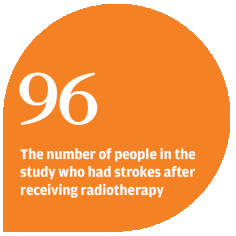Cancer patients receiving radiotherapy may be at higher risk of vascular diseases and stroke: study
Researchers warn cancer treatment could lead to permanent disability a decade after therapy

Patients who receive radiotherapy to treat cancer in their head or neck may be more likely to develop severe vascular diseases including blocked blood vessels, leading to a higher risk of a stroke, a recent study has found.

But the study also found that at least one method of treating radiation-induced stenosis is highly effective - carotid angioplasty and stenting (CAS), in which a mesh tube is inserted within diseased blood vessels to prevent the narrowing of the carotid artery.
"CAS is an image-guided and minimally invasive method of vascular reconstruction," said Simon Yu Chun-ho, professor at the department of imaging and interventional radiology of Chinese University's faculty of medicine. "It's also a well-developed and mature technique."
From 2006 to last year, the faculty's department of medicine and therapeutics analysed images of the carotid arteries of 96 patients who had strokes after receiving radiotherapy to treat head and neck cancer.
Researchers compared the images with those of 115 patients who suffered strokes caused by atherosclerotic stenosis, or thickening of the artery wall.
The results showed that 54 per cent of the former group had both of their carotid arteries affected by stenosis, compared to 22 per cent in the latter group.
